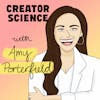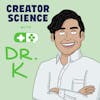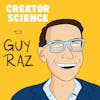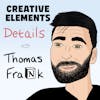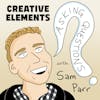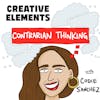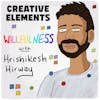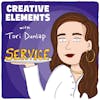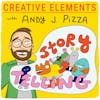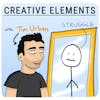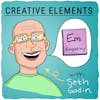
#45: Jess Cordova Kramer and Stephanie Wittels Wachs of Lemonada Media
Play EpisodeTurning life's lemons into lemonade, one podcast at a time
Jessica Cordova Kramer and Stephanie Wittels Wachs are the co-creators of Lemonada Media, a podcast network that shares the unfiltered version of the human experience.
In 2015, Steph lost her brother, beloved comedian Harris Wittels, to a heroin overdose. And in 2017, Jess lost her newly-married brother Stefano Cordova, Jr. to a fentanyl overdose.
In this episode we talk about creating Last Day, how Stephanie produces their narrative shows, how Jessica’s intuition led to creating Lemonada Media, and why creativity can help us express grief.
Transcript and show notes can be found here
If you or someone you know is struggling emotionally or feeling hopeless, it’s important to talk to someone about it now. In the show notes I’ve included resources for free, confidential conversations with a trained counselor anytime.
National Suicide Prevention Lifeline: 1-800-273-8255
Crisis Text line: Text “Connect” to 741-741
***
LISTENER SUPPORT
Join our community on Facebook
Support this show through Buy Me A Coffee.
***
SPONSORS
Try Podia and save 15% for life as a Creative Elements listener
Start your free trial of SavvyCal and get your first month free using promo code ELEMENTS
***
ABOUT JAY CLOUSE
Subscribe to my weekly newsletter
Follow Jay Clouse on Instagram
Enroll in my course on podcasting, Podcast Like The Pros
***
PODGLOMERATE NETWORK
This show is a part of the Podglomerate network, a company that produces, distributes, and monetizes podcasts. We encourage you to visit the website and sign up for our newsletter for more information about our shows, launches, and events. For more information on how The Podglomerate treats data, please see our Privacy Policy.
Since you're listening to Creative Elements, we'd like to suggest you also try other Podglomerate shows surrounding entrepreneurship, business, and careers like Rocketship.fm and Freelance to Founder.
Learn more about your ad choices. Visit megaphone.fm/adchoices
Stephanie Wittels Wachs 0:00
So we sort of had this idea early on that it would be kind of like with humor, which feels wrong. But we sort of early on were like, We got to get some sugar in this medicine, or people aren't gonna want to take it.
Jay Clouse 0:14
Welcome to Creative Elements, a show where we talk to your favorite creators and learn what it takes to make a living from your art and creativity. I'm your host, Jay Clouse. Let's start the show.
Hello, my friend. Welcome back to another episode of Creative Elements. Now, this probably won't surprise you. But one of the mediums I want to explore more over the coming months is podcasting. I truly want to continue to improve as a podcaster and to push the envelope on the quality of this show. Now we start to dig in that direction a little bit with last week's conversation with Jordan Harbinger, one of the biggest podcasters on the planet, and we're continuing with this week's episode. Now, I want to warn you today's episode has some heavy themes. We talked about drug use, suicide, and there are some explicit language too. So if that's not something you're up for right now, or if you're around kids, you can abort this episode now and there is no hard feelings. Okay, you're still with me? Cool. Today I'm talking with the co creators of Lemonada Media, a podcast network that is turning life's lemons into lemonade one podcast at a time. Their first podcast Last Day premiered in the fall of 2019.
Stephanie Wittels Wachs 1:36
This is Last Day, a new podcast from Lemonada Media about the things that are killing us and I'm your host Stephanie Wittels Wachs.
Jay Clouse 1:45
Stephanie Wittels Wachs is the chief creative officer for Lemonada Media alongside her co founder Jessica Cordova Kramer. Stephanie is a theatre director, a well known voice actor, and the author of the best selling memoir, Everything Is Horrible and Wonderful, a Tragic Comic Memoir of Genius, Heroin, Love and Loss. Jessica is the executive producer of the Pod Save the People podcast, which has won multiple Webby Awards. She began her career as a wall street lawyer who moonlighted on pro bono domestic violence and refugee cases and even worked for Teach for America. So you may be wondering why these two women would want to make a podcast about the things that are killing us. Well, unfortunately, they both know the topic all too well. In 2015, Steph lost her brother beloved comedian Harris Wittels to a heroin overdose. Harris was a writer and executive producer for Parks and Rec among a lot of other incredible work. And in 2017, Jess lost her brother Stefano Cordova Jr. to a fentanyl overdose. The two of them were total strangers living 1000s of miles apart, and just just happened to hear stuff on a podcast, and episode of Terrible, Thanks for Asking. And so just reached out.
Stephanie Wittels Wachs 2:56
I really did have a very young baby. When we when we started all this. I met Jess a week before I was going to give birth to that human being. And in fact, when she she was executive producing Pod Save the People with DeRay. And she reached out about my being a guest on the show. And in that phone call that lasted like an hour. I mean, we were just like very connected in this sort of cosmic way very early on. I hate the phone. But I stayed on with her for a very long time. At the very end, she was like, do you want to do this podcast about opioids? I have this idea. I don't know if you're into it. And I was like, lady, I'm about to pop, I got a giant baby. I'm five feet tall. I'm like a beach whale. But let me give birth. And I'll circle back with you. The idea being I probably wasn't going to I did want to be on positive people. But doing a podcast about opioids is really not in my in my toolbox of things I wanted to pull from.
Jay Clouse 3:55
But the idea for the opioid podcast stuck around in both of their heads. And it wasn't long until Stephanie had the impulse to reach back out to Jessica.
Stephanie Wittels Wachs 4:03
The three month old baby was uh, you know, now three months, and I read an article that that opioids are killing more people than car accidents. I probably was nursing at the time. And I emailed Jess and said, Okay, I don't want to do this, but it is killing everyone. So let's do it. You know.
Jessica Cordova Kramer 4:22
Your opioids podcast sounds better than breastfeeding this baby.
Stephanie Wittels Wachs 4:25
Truly
Jessica Cordova Kramer 4:26
Please save me from early motherhood.
Stephanie Wittels Wachs 4:28
Please save me from what's happening in my body.
Jay Clouse 4:31
And not long after that. Jessica and Stephanie formed Lemonada Media and began producing season one of Last Day, telling the stories of their brothers and focusing on Jessica's brother Stefano's last day.
Stephanie Wittels Wachs 4:44
We're trying to understand the why and the how of America's most massive epidemics by zooming in on one person's story, more specifically, their last day. Then we rewind the tape. We look at all the circumstances that brought them to their last day. So we can figure out how they got there, and how we, as a society have gotten here. Our first season we'll be talking about opioids, because unfortunately, it's the epidemic. I know best. My brother Harris Wittels, a comedian, beloved human died of a heroin overdose in 2015. So naturally, we are talking to comedians Aziz Ansari, and Sarah Silverman, both noted experts on opioids. No, that is a lie. They were friends of my brothers, they are not experts in this field at all.
Jay Clouse 5:43
It's a really powerful emotional show. But as you may have noticed, from just these short clips of Stephanie, and Jessica, they don't seem heavy or depressed in the way that they talk about these subjects. In fact, they almost sound upbeat and joyful. When it comes to the Last Day, that's by design.
Stephanie Wittels Wachs 6:00
I had this feeling that I knew it was gonna be hard, and it was gonna be like highly produced and edited. It had to be so deeply narrative and pleasant to listen to, because we were going to be talking about dying from heroin. And, and that is not something that you want to tune into. So we sort of had this idea early on that it would be kind of like with humor, which feels wrong, but we sort of early on, we're like, we got to go put some sugar in this medicine, or people aren't gonna want to take it. That's a weird metaphor talking about heroin, but you know what I'm saying.
Jessica Cordova Kramer 6:35
But it is related to our brand like the Lemonada, like the idea that you'd sweetened something sour. And that's the only way people can handle.
Jay Clouse 6:44
The two of them have been backed down from tough subjects. Lemonada Media has grown to 10 shows now, including shows on policing, drug recovery, and the large American population struggling to make ends meet. In October of 2020, they released season two of Last Day.
Stephanie Wittels Wachs 7:00
But this time, we are tackling a new topic. And it's complicated.
Unknown Speaker 7:06
I think what's tricky about talking about a suicide epidemic? Well, there are many things. One is that suicide has been a major public health problem forever. The reason that it's not been in people's awareness is because it's such a stigmatized behavior that people by and large, don't want to talk about it.
Stephanie Wittels Wachs 7:24
But we do. So let's talk about it.
Jay Clouse 7:29
In this episode, we talked about creating Last Day, how Stephanie produces these narrative shows. How Jessica's intuition led to creating Lemonada Media in the first place, and why creativity can help us express our grief. This is a slightly shorter episode than usual, because my internet connection went down for 15 minutes in the middle of the interview. And being the incredible people that they are Jess and Steph stuck around and waited for my internet to reconnect. I cannot thank them enough for that it gave us enough content to make a full episode here. I'd love to hear your thoughts on this episode. As you listen, you can find me on Twitter or Instagram @JayClouse. And if you're not already in our listeners group on Facebook, I'd love for you to join. But now, let's talk to Jess and Steff.
Jessica Cordova Kramer 8:10
I didn't actually think about doing an opius podcast till I was on the phone with Stephanie. And I was like, there's something here like we are to we went to college together, Stephanie, I didn't even know each other there. But like we were two high performing people from functioning, mostly families who had awesome brothers who ended up accidentally addicted. I don't know if anyone gets purposely addicted, addicted to heroin. And they died and it like cut them down in the prime of their lives. And it fucking sucked. And so I just like talking to her and I was making a really big podcast. And so podcasting was on my brain. So I did slip it in there. It ear wormed into my own head. So you know, that's what happened. And we started to come up with a light concept for it, which was not the it was the original concept was not the last day shows something dumb. And we were talking to some networks about it. And then the idea started to marinate. And I think I said to Stephanie, at one point, like, everyone else can do podcast networks, like, why don't we, why don't we put our own show out at least. And then in the course of making Last Day we were we had 400 other ideas. And here we are.
Jay Clouse 9:20
Can you tell me a little bit more about your background, Jess, and what you're doing with Pod Save the People and why podcasting was on your mind.
Jessica Cordova Kramer 9:27
Yeah, I still make that show. By the way. It's my like, weird side hustle. DeRay is one of my best friends on the planet and the Crooked people are amazing. And every month I'm like you guys do still I mean, like I literally run another network. It's like, we don't compete, please. Like can I please be done? And they're like, yeah, here's the thing about it. It's great show. Oh, and we so love them, love the show. And I believe in the show so deeply like it's providing such a needed space, but I was not a big podcast fan and I didn't have an audio background. I had the most boring career ever compared to, you know what we're doing. Now I did cool stuff in the day to day but nothing like this. I was a lawyer and then did nonprofit management. And then Dre texted me one day in the middle of the day and was like, I got a podcast with Crooked, I need help. And I was like, okay, donate, like literally no idea what parameters of help he needed? Like, do you need me to help buy you a microphone. I don't know how to do that. But I love you. So I'll help you. So we ended up making that show. And it's in season three. Now. It's won, like tons of awards. And so and the cool thing about that related to Lemonada, and the Crooked people have been so helpful is a lot of badass women who helped run that company. They're super supportive. They were with me when my like, when my brother died, they were like, I was literally like in it, I was in the mix. And so they were incredibly supportive. I got to see a startup go from like, zero shows to four shows to 10 shows, and the behind the scenes and help build the audience and monetize and all that stuff. So we had some business acumen coming in, and some advice coming up.
Jay Clouse 11:02
So then my next question would be, you know, you you had this experience with Crooked and building Pod Save the People, you knew that podcasting to the degree that last day is taking the form of is a serious investment of effort and time, you guys aren't just flipping on the microphone, having conversation and publishing it.
Stephanie Wittels Wachs 11:20
So I think that's what happens actually, Jay.
Jay Clouse 11:25
It's not even what happens in my small operation. So talk to me about how you guys worked through that and how you came to the decision of what the format of the show would be because people listening to this probably don't have a lot of an idea of the reality of what it takes to make a high production value podcast.
Stephanie Wittels Wachs 11:41
Yeah, I mean, the interesting thing about that is that aside from breastfeeding, I had a career as a, as an artist for a long time and a variety of mediums. So I primarily was a theater director, and voiceover actor, but like when you're when you're directing a play, it is a six week to eight week production process, right for weeks on the short on the short end, to bring that thing into life to take it from like the page to the stage, if you will, I'm sorry, I will never say that again. And
Jessica Cordova Kramer 12:13
don't edit that out. If you dare edit that out. back, please make that an audio gram. Please edit that. And then tag her on Twitter, so we can all retweet it, it'll be great.
Stephanie Wittels Wachs 12:26
So an artistic process, taking a while to sort of cultivate and to collaborate and to take this thing and breathe life into it. I don't have the capacity to put press record, put it into a microphone and put it up. I don't I don't know how to do that creatively. Every creative thing that I've ever done, including like writing a book and has gone through revision after revision after revision after revision. So like the storytelling part of podcasting, it is a long process. I don't think people know or.
Jessica Cordova Kramer 12:57
Just laughing because it's Stephanie had her way she would never release every episode of any
Stephanie Wittels Wachs 13:01
Ever.
Jessica Cordova Kramer 13:02
Ever.
Stephanie Wittels Wachs 13:03
There's a quote in the theater. It's like we don't we don't open we don't open the curtain because it's ready. We open because the audience sits down and has read and is paid to see it. So yeah, there's like that Philip Seymour Hoffman movie Schenectady, New York, where he like, is this mad artist, and he spends his entire life working on this one thing. I felt that I watched that movie, and I cried, I don't even know why it was so crazy and ridiculous. But I was like, Yes, that is what it feels like to just want to tweak and tweak and tweak and tweak and tweak. And that's sort of Jess and I are really good partners in that way that I am. So in the weeds, and I'm so meticulous and my attention to detail. You know, like if there's a breath out of place, I'm like flagging it on a Google Doc. And just is like much more big picture and visionary. Like how she said, I was on the call with you. And I have this idea. Like, he's still emailing me at three in the morning with ideas constantly. And I respond to like, one out of every 10 you know, so. So there's this nice balance of, we've got to get this out the door and me being like, No, but I need to hone it so that it's beautiful and breathes right and is paced correctly and that it's ready for consumption. You know, you you need both of those things, to make something, you know, sort of thing.
Jessica Cordova Kramer 14:16
Yeah, I have a running joke with Stephanie where like, when I get the email that's like, I think we need to postpone launch. It's not ready. It's not gonna happen. I know. It's like on the verge of being amazing. Like, I'm like, sounds good. Let's just like wait one more week to decide. And then she'll eventually maybe back within 18 hours, and I'll be like, JK, it's the best thing I've ever made. It's ready to go. I can see the whole process is very intense.
Jay Clouse 14:42
And this is your first podcast, right, Stephanie?
Stephanie Wittels Wachs 14:44
I did a podcast for two years called Hands Off Parents. It was a tiny little operation with me and my one of my best friends Abby, we had kids, she had twins and I had my daughter Iris two weeks apart. And so we would basically just drink a bottle line and speak into microphones and then upload it onto SoundCloud. And we still have like an active Facebook page. You know, we did this podcast for like two and a half years like our kids would play in the background, it was so sloppy. And that was the whole point of it that we were, you know, kind of like terrible or mediocre mothers. So and I did have this like career as a voiceover actor. So talking in microphones was really comfortable for me in an audio format.
Jay Clouse 15:25
After a short break, we talked about the creative process of how Stephanie and Jess produced shows like Last Day for Lemonada Media right after this. Welcome back to my conversation with Jessica Cordova Kramer and Stephanie Wittels Wachs of Lemonada Media. I've been podcasting for the last three years now. And so it's getting very easy for me to identify when people put a lot of time and effort into producing a show versus not. And it didn't take long for me to notice just how much effort Jessica and Stephanie put into last day. So I asked Stephanie, if she knew what she was getting into when she told Jess that she wanted to make the show.
Stephanie Wittels Wachs 16:01
I felt like my expectation very early on is that we were creating this American life. I was determined to do this in a way that was way complicated. And you know, Jess was like, Yeah, well, we'll do a couple of interviews and each episode and I was like, Yeah, yeah, totally, totally. And then in my mind, I'm like, like that, what that gift of that woman who's like seeing the number? Yeah, her eyeballs are going. I was like, totally two interviews, and then we're gonna chop them up and dice them together and make a stew. We were co hosting at first, like our pilot episode that we did. We were both on the mic together. It was such a different kind of a show. It took a while to figure out what the format would be.
Jay Clouse 16:49
Just a this go beyond the scope you had originally imagined when you said we're going to do a couple interviews did Stephanie come in and, and blow this into a much larger thing than you anticipated?
Jessica Cordova Kramer 16:59
No, it's exactly what I thought it was great. Yes, it definitely in the best way possible. But this is what I love about working with Stephanie is like, she will take an idea that she likes she will ignore an idea that she doesn't, but she will take an idea that she likes. And you just hire a team around it, figure out what she thinks it is. Throw it away a few times bring it back to life. And it's painful. Painful, it's like, super painful. It's like watching a dog give birth to like a really big litter over and over and over again. Like, but the intense dog comes out. Like, is it fucking over yet? You know what, it's beautiful in the end. And like last the season one was fucking brutal. Like, it was brutal. It was weird. It was my brother, my dad was on it. My you know, with audio from my brother who passed away, we recreated the last day of his life, because that's the show is you zoom in on someone's last day. And then you zoom out to understand that sort of macro environment that allows her epidemics, I felt really in the weeds. And in last a season one in a way that was like exhausting for both of us. And on season two, it's not about us. So I listened with everyone else. Like I did a lot behind the scenes to like set up the partnership with Jed and like, maybe I don't even know if I identified one guest this season. Probably not. But when I listen, it's like with regular folks out there. I have not listened to one cut. So I just think she's freaking amazing. She knows I'm her biggest fan. Like truly.
Stephanie Wittels Wachs 18:39
But you are still you're still seeing me give birth to that litter. Be holding the pain.
Jessica Cordova Kramer 18:47
It is painful. But you are becoming more meta aware of it. Like I don't know how many episodes of shows you've produced. Those are, you know, you make all our shows like where are we at like 200 episodes now probably. So you've overseen every single one and I feel like you're getting slightly more than it's like there's only six puppies in this litter. You're smoking a cigarette through the labor. Midway through you have a mojito. It's fine.
Jay Clouse 19:12
I'm gonna come back to Last Day here in a minute. But we have a lot of creators of the show and they love to get down into the weeds on how some of this stuff works. So Steph, if you will humor me, can you talk me through your process of producing some of these shows?
Stephanie Wittels Wachs 19:27
Oh yeah, okay.
Jessica Cordova Kramer 19:30
You need it. You need a therapy session
Stephanie Wittels Wachs 19:32
My armor. So every show is so different. It's like tell it's like if you were to say, Tell me about your two children, you know, like they're completely different and take different things to make them function and grow as people. So with the show like last day or something that's narrative. You're spending a couple months trying to figure out what's the story? What, what, what do we want to talk about this season? What's important, what do we have to hit? So there's like this massive kind of research phase, this sort of spider web thing that's happening where you're talking to this person that connects you to this person that connects you to this person, and you've got this massive list of people you want to talk to you, then you start getting tape, just like doing interview after interview after interview after interview, and your Google Drive is just full of tape and names and possible topics.
Jay Clouse 20:20
Clarifying question when you're getting this tape, is it because you've already constructed the narrative arc, you know, who you want certain sound bites from? Or are you saying, I just want to collect a store of this so that I can artist it together?
Stephanie Wittels Wachs 20:32
That's a great question. You have an idea of the topics that you want to hit right and you start talking to people this is the status part is that there are a third of interviews that we collect, we end up not airing, we use them as research, we use them as data for our for our scripting and voiceover. And the sort of lessons that we're providing on the show lessons is not the greatest word. But the takeaways, right? We use them in terms of like, so I'm not googling this, but I have an actual expert saying it. So you have a general idea, like we want to talk about PTSD, we want to talk about veteran suicide. So we talked to like tons of specialists in that arena. We want to talk about teen suicide, right? suicide, non suicidal self harm, you know, you you you cultivate just this sort of like treasure trove and of experts and voices so that you're acclimating yourself to this world. Like it's a completely new world, it was very different than season one, because I, I didn't have personal experience with this. Once you get all that, then you sort of hone that episode outline for this for the season. And then you figure out what's the narrative arc of the season? Right? Once you do that, you figure out where are the holes? Who do we still need, and then you start putting it all together. So doing your version one of your script, pulling your clips together, listening to the clips, writing the scripting, and the video in between figuring out what's the narrative arc of each episode? How does that work in the narrative arc and the entire season? I mean, it's, each script has around, you know, eight to 10 versions, you're listening to a version cutting more listening to a version tweaking this view listening to a version, you know, it's kind of a miracle when they come out. It's like, Oh, wow. Like the episode we put out today has five voices in it. There's two sisters, one mom, developmental psych psychologist, my voice, and then also, the writings and live journals and diary entries of this woman who died by suicide. So there's really six voices in this episode. So that's kind of how that works, right. And then other season, other other series are different when you have shows that are more interview based, you know, like in the bubble and positive people, these kinds of shows, you know, just can speak directly to those as well. But you're figuring out like, this is this is, this would be a good episode, this is a topic we have to cover, you know, it's more timely, it's more tied to the news cycle, there's more like, immediate gas that has to be put onto those. So every process is very, very different.
Jay Clouse 22:59
Yeah, that's really interesting, though. I've never done a seasonal show. But I like the idea of, okay, at a top level, what is the narrative that I want to tell in the season? And then how does that break down into episodes and then break all those episodes down individually? I think I think a lot of people also need to hear that a lot of the material that you create or record doesn't get used, and that's okay. That feels like a scary thing when you're making something and you create something and then eventually, you realize no one's gonna see that.
Stephanie Wittels Wachs 23:25
I never feel like it's okay. This I mean, I want to use every ounce of audio that we have. But you're right, it just doesn't if you're doing a 12 episode season, and each episode is 45 minutes to an hour, you do not have and you've collected 100 hours of tape. I'm no mathematician, but you can't use all of that tape. Right. And the other thing that I do want to say is when you're talking about a narrative season, you really do need to start with a primary driving question like this is the thing we're trying to uncover or unpack this season. That's been really useful and helpful for us.
Jay Clouse 24:05
When we come back, we talked about how Jessica and Stephanie knew that the world was ready for a show like last day. And a little bit later, we talked about how the creative process plays a role in grieving. So stick around, and we'll be right back. Welcome back. This whole conversation has been a little uncomfortable. These are really heavy and even taboo subjects, not just for me, but for society. So I asked Jessica, how she knew that the world is ready for a show about the things that are killing us. Things like heroin and suicide.
Jessica Cordova Kramer 24:36
I think we have it was February 2019 when we really formed Lemonada and knew that the opioid show which I don't think was called last day at the time, I think we're calling it antidote Fun fact I told anyone that which is clever title but wasn't really the core of the show that we ended up with. And it was 2019 it was February everyone in America And probably the world but we were selfish and focused only on our own, our own nation was miserable. It's hard to remember that you were miserable in 2019. But statistically speaking, you were, and so was everyone around you. Like the data was extravagant, like 40% of Americans said they felt lonely, something like 70% of working Americans sat in their car for some period of time alone, just to avoid whatever the hell they were going to the party, the work, the home, whatever. So we kind of like leaned into that space. Our brothers dying was one form of misery, their own stuff that they were struggling with was a symptom of it. And I think we knew there was a market for it. But we knew like gloom and doom wasn't gonna sell or be interesting or be helpful to people like it, just like I won't listen to the latest news article or read the latest news article on like, what's happening with Purdue pharma or the opioid crisis? Because I'm like, not hopeful, I'm not going to bring my brother back. It's fucking miserable to think that there are 70,000 people this year who feel the way I feel that's not helpful. So we wanted to do a different thing. And we really struggled with whether last day should come first, because it is our hardest show, by far. And I think ultimately, we felt like it told our story, and it was important that it came first and that it was good. So that was that? I mean, that's the simple version of it stuff. Would you add anything else?
Stephanie Wittels Wachs 26:29
I don't think when we started, we knew we would have a huge audience for this show. We I'd certainly didn't. Yeah, we had to do it. There was a there was a compulsion to make it. We were on this personal quest to answer the question, what could we have done differently? Could we have saved our brothers, I was interested in figuring that out. And Jess was so fresh in her in her grief. And I had already kind of like, processed in a way, losing Harris because I'd written this book that was called Everything that's Horrible and Wonderful that also, there were funny parts as well. And I said to just like, you're very close to this still. So what if we, cuz I don't really want to tell the Harris's last day story again, I already feel like I did that would if we tell Stefano's last day. I host the show your your voice in the show. But there's some sort of like separation there. Right. Because it's tough. It's hard. It's painful to like, dig into that. And that ended up working for us. And then I think the show naturally took on my tone. Which is completely irreverent. And I say fuck a lot. I, I've gotten some flack about that on the old reviews. If you like the show, please review and give a positive one. But that's in terms of like, what we have the tone, I think that's how that happened. Would anyone listen? Didn't didn't know, didn't know that. The fact that so many people are listening is very sad, in a way happy for us, but like, points to the fact that this really is a problem. And nobody knows what to do. And people are finding solace in this. They're finding comfort and they're finding answers and solutions. There's part of it's like, well, that sucks that we didn't have the solutions for our brothers. Right? My dad is a doctor, he's retired, he always says like, that's the deal with medicine. You can't think about, well, they didn't have this cure, then you just got to keep moving forward. We're always going to be better equipped than we were yesterday. We're always going to be having more information, more breakthroughs, more experts, and addiction six years ago, which is when Harris died about six years ago, the field is completely different now. I mean, the fact that Oregon just passed this decriminalization of all drugs, right, personal possession of all drugs, is massive. I kept I was saying yesterday to to our producer, if this Oregon story had broken while we were doing the podcast, it would have been its own episode. It's a huge shift in the way that we're thinking about drugs and addiction in America, we've been really late and really behind the curve. Mm hmm. So it's an interesting process. It's like we could keep doing the podcast because things keep changing every day. I will not continue to talk about opioids. But we do have in recovery now, which is the show with with Dr. Anthony Harrison, who was one of our like MVP on the show, she kept coming back. She's an incredible Addiction Medicine doctor, full of compassion and humanity. She has a really progressive view of treatment and addiction. And when we were sort of done with last day, season one we said, like we're done telling the story, but our audience is not done talking about it, and what can we do and how can we continue to help these people because our whole thing with Lemonada is content yes and community that we we do both we want to cultivate both. So we found this natural sort of spin off almost, and so in Zynga continues to talk about addiction, and I continue to find a lot of comfort in that show as well.
Jay Clouse 29:59
A lot of people listen to the show, you know, they're creatives. And they probably deal with grief in their own way, using creativity as an outlet. And I'm curious what you guys have learned about how to have difficult conversations or treat sensitive subjects in a way through art and sharing your voice with people.
Stephanie Wittels Wachs 30:22
There's a cathartic experience that comes along with sharing your grief. That's pretty much what we've done entirely here, what I did with my book, it's what I do with the podcast, the way I describe it is if you have all that toxicity in your body, and it's sort of just like sitting in there, it helps to get it out. And then when you get it out, you end up connecting with other folks who've experienced the same thing, because we're all human. We are all mortals, and we all have to deal with death, and loss and sickness and hardship at some point. So I say like, if you're putting your experience out there authentically, I think it can be very therapeutic to put it out there.
Jay Clouse 31:00
Have you guys faced worse blowback from talking about subjects like this than you expected? Or has it been easier than you thought?
Jessica Cordova Kramer 31:07
Yeah, I think it's been easier. I think people just are so appreciative that we're willing to share our stories, because they can see themselves in our story in a variety of ways. And when you talk about death and grief that involves stigma, like the only way to eradicate it is through talking about it openly. And the dark parts and the light parts, I think, with deaths that involve stigma, you also get people who have opinions about it. So you know, people aren't that gentle with addiction or haven't been historically, I think now more than ever, people are talking about addiction and know someone who is suffering from an opioid use disorder or meth use disorder or alcoholism. And and I think there's more conversation around it being a disease of the brain and not a moral failing. And that that happened before us that's happening with us and before us. And, you know, we were a part of helping create platform to talk about that more, but it is, it is providing a gentle or landing for folks who are either struggling with addiction around people around them who are saved for suicide, I'd imagine I mean, this show came out years after the journalistic standards change to died by suicide, not committed suicide, and that is the sense of like, people aren't trying to hurt you. They are suffering greatly. And there's a compulsion to end that suffering. I don't know. I mean, I, we've had a couple of nasty comments about our heroin addicted brothers and our shitty families. But for the most part, it's been okay.
Jay Clouse 32:34
What do you think about the medium of audio as a platform and the opportunity that's still there for people who may be just thinking about getting into podcasting?
Stephanie Wittels Wachs 32:42
I think the thing that's so great about it is that there is such an accessibility, that really, anyone can create a podcast, I had a girlfriend the other day, whose son is on the spectrum. And they're dealing with a lot of stigma and their community and in their school community, and they want to talk about it. And they want to interview other parents. And they said, we want to, we want to do a podcast, give us tips. I'm like, yeah, go on Amazon, buy a zoom recorder, get some mic cords, get it, get an SD card, start talking into a microphone, go into GarageBand or audacity, edit it, that's all available for you, and then put it out, right. So there is this, anyone can do this. And I think that's, that's very cool. There's something really neat about the fact that I can have an idea and follow through with it. And there's no, there's not this sort of exclusivity around it. I think it is a very intimate medium. I think that it's a growing industry. So anything you want to find content on you can, you can find your voice reflected where you want to find it. I think it's a terrific medium, and you don't have to put on pants, or shower. which is my favorite part.
Jay Clouse 33:57
If you made it this far, thanks so much for listening through what I know is a heavier and more uncomfortable episode than most. But like Jessica and Stephanie, I didn't want to shy away from topics like this. These are such rampant issues in the United States and even the whole world today that it's important that we talk about them. After all, if people who have experienced loss like Jessica and Stephanie can talk about this, shouldn't we be able to too. And as a podcaster, I was so appreciative of Stephanie sharing behind the scenes of how she thinks about constructing a narrative arc for each season and episode. That's a second level of thinking that I haven't gotten into with Creative Elements yet, especially since this show isn't seasonal. But it really goes to show just how much planning and work goes in early on for shows like last day. If you want to listen to last day, you can find it wherever you listen to podcasts. And if you want to learn more about lemon on a media and there are other shows, you can visit lemon on immediate.com links to both are in the show notes. And if you or someone you know is struggling emotionally or feeling hopeless, it's important to talk to someone about it now in the show. Notes I've included resources for free confidential conversations with a trained counselor anytime. Thanks to Jessica and Stephanie, for being on the show. Thank you to Emily Clouse for making the artwork for this episode. Thanks to Nathan Todhunter for mixing the show, and Brian Skeel for creating art music. If you like this episode, you can tweet @JayClouse and let me know if you really want to say thank you. Please leave a review on Apple podcasts. Thanks for listening, and I'll talk to you next week.
Most Popular Episodes
New to the show? Check out some of our most popular episodes.






